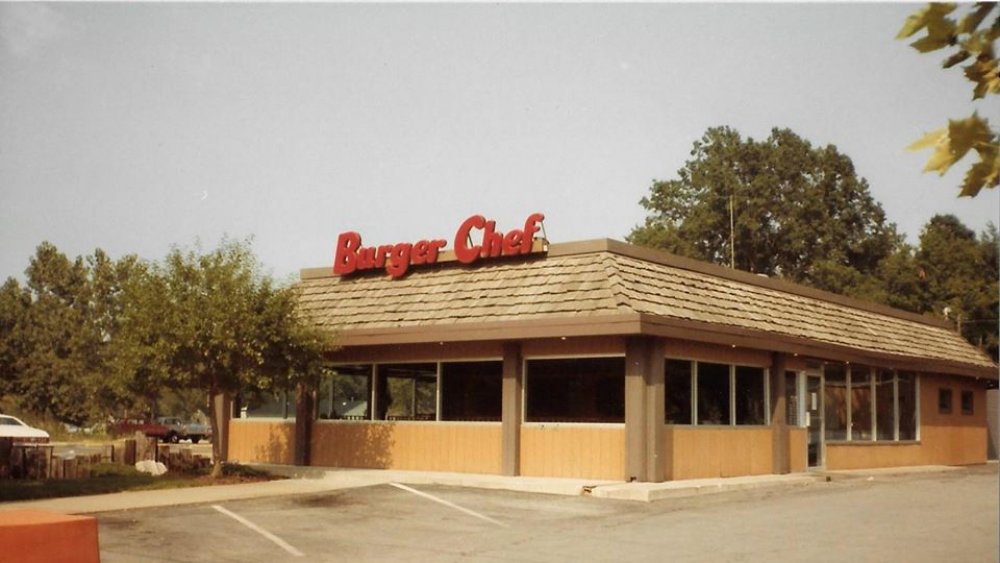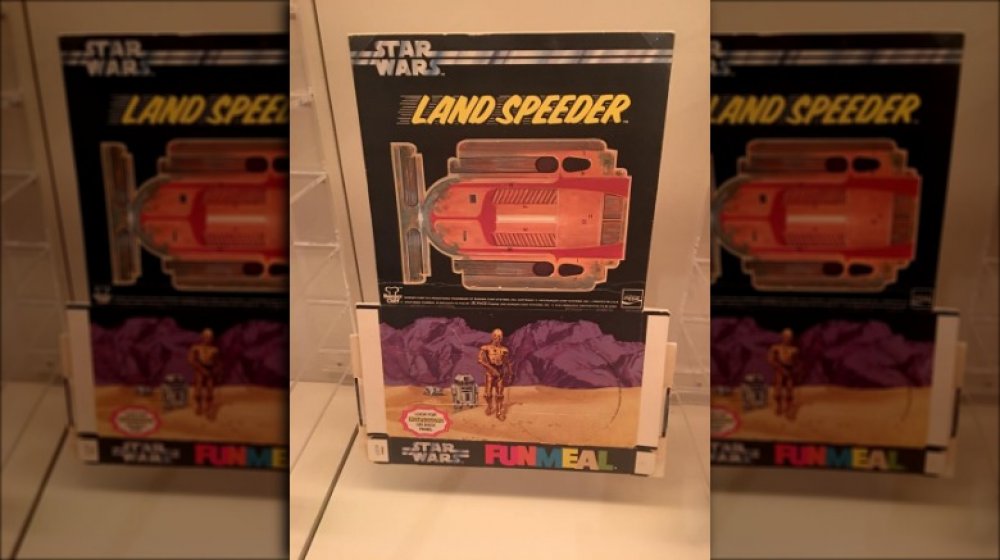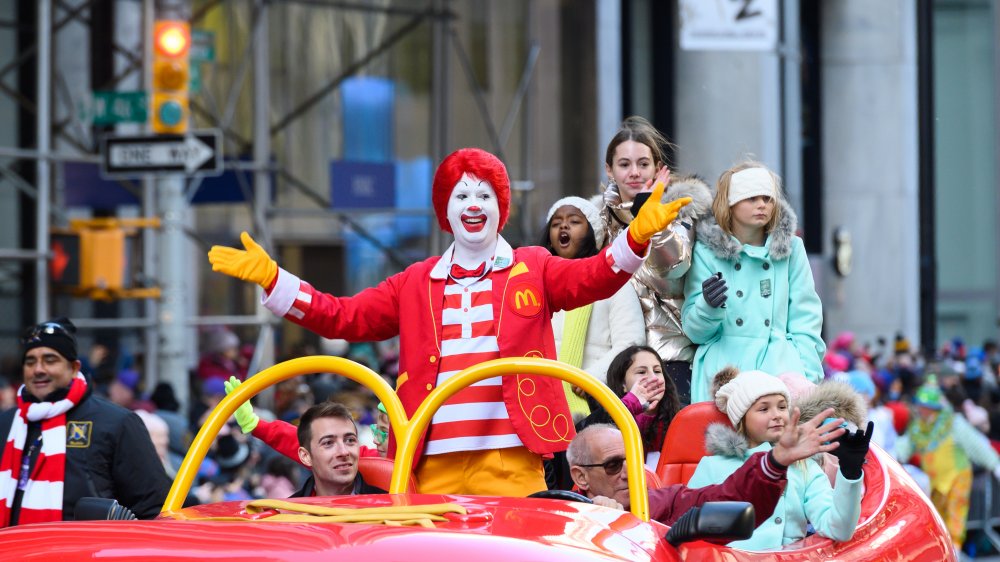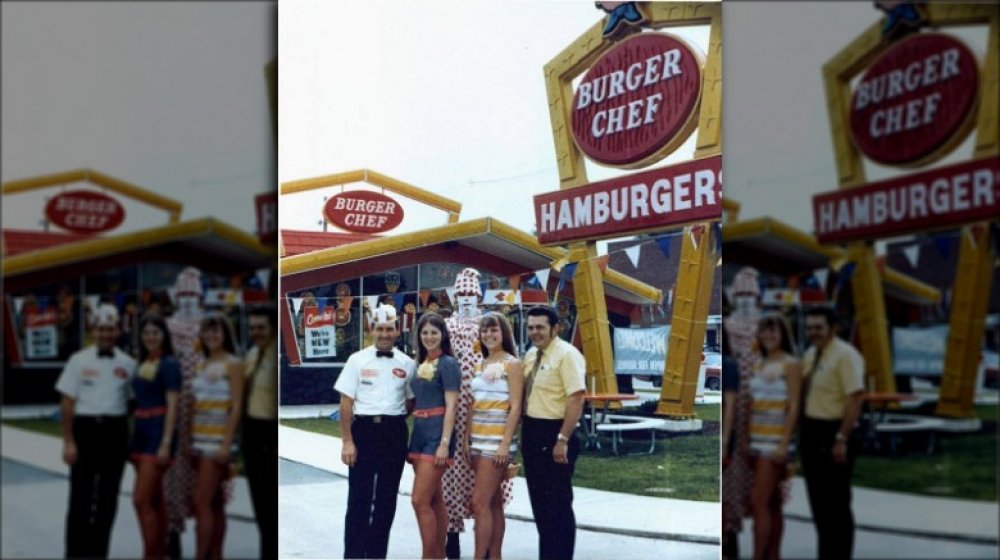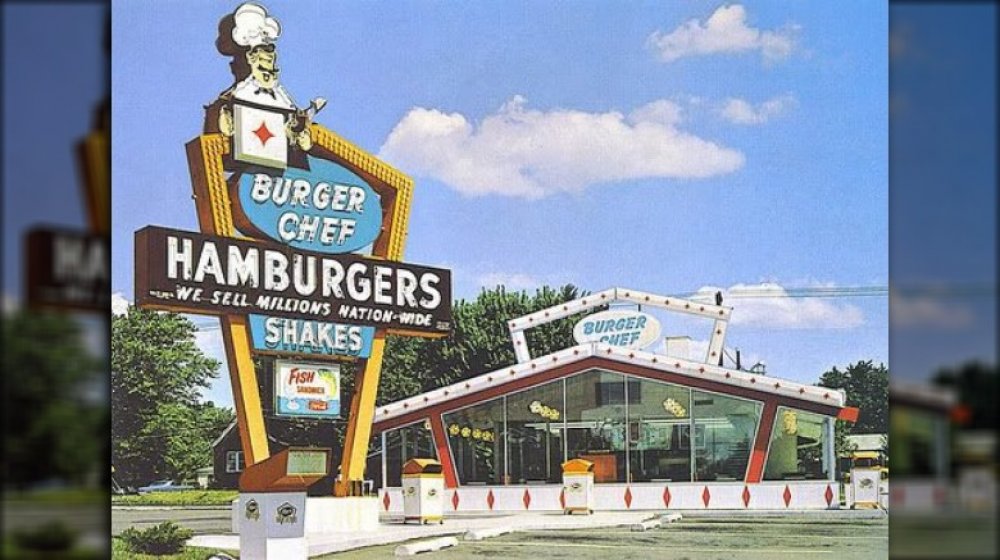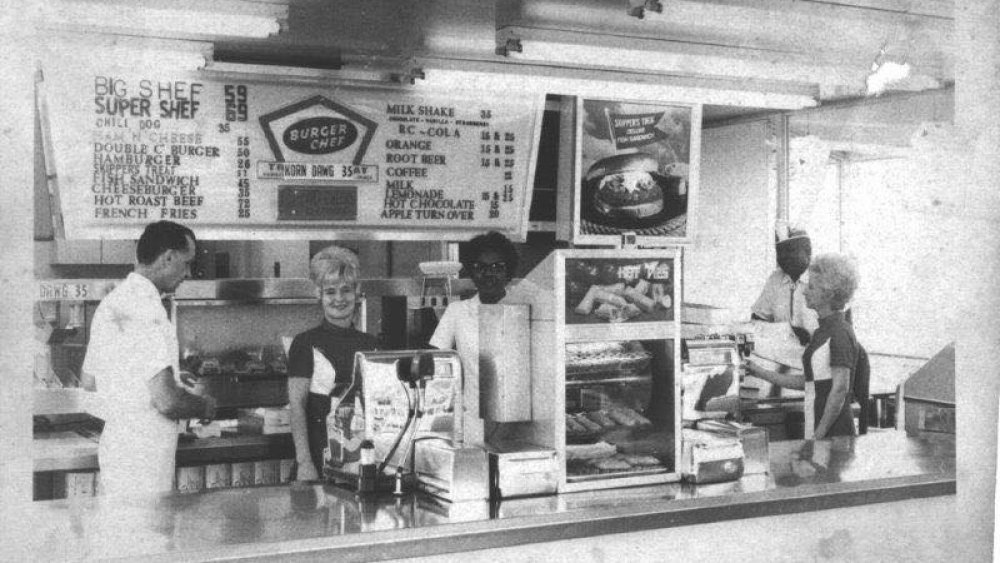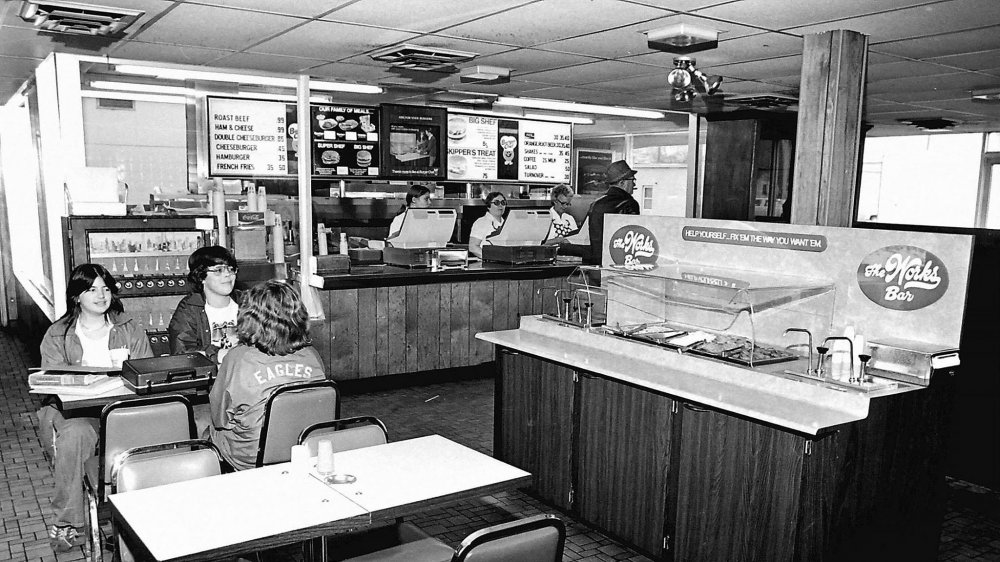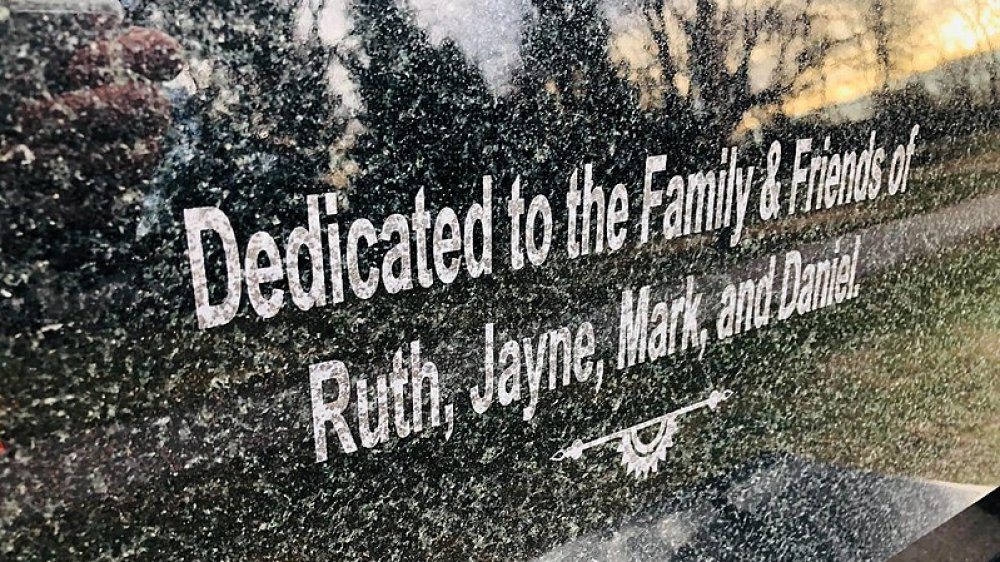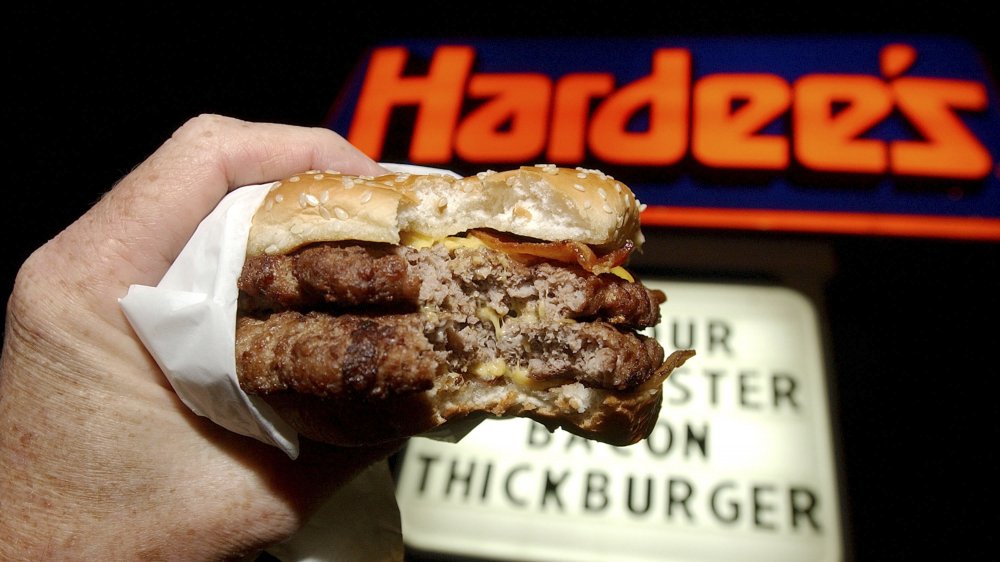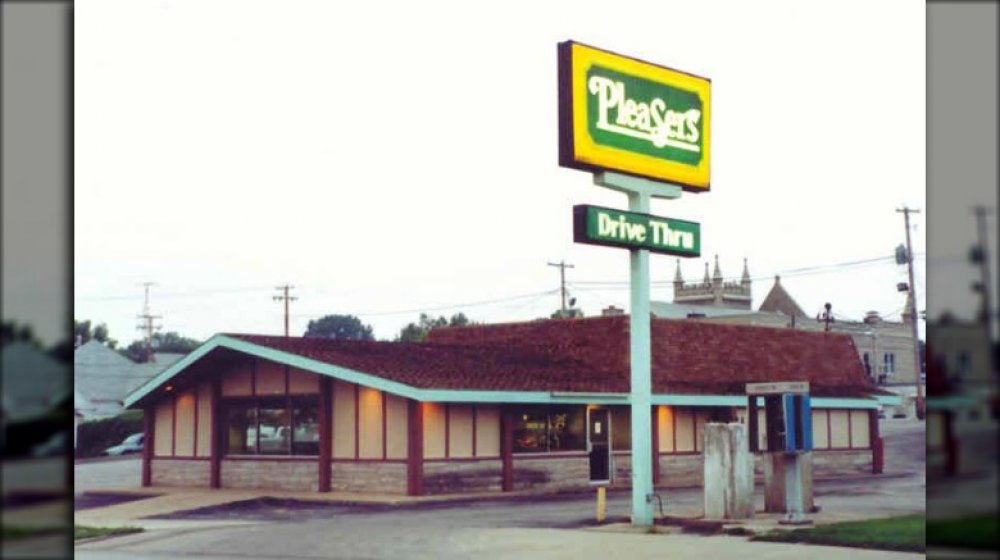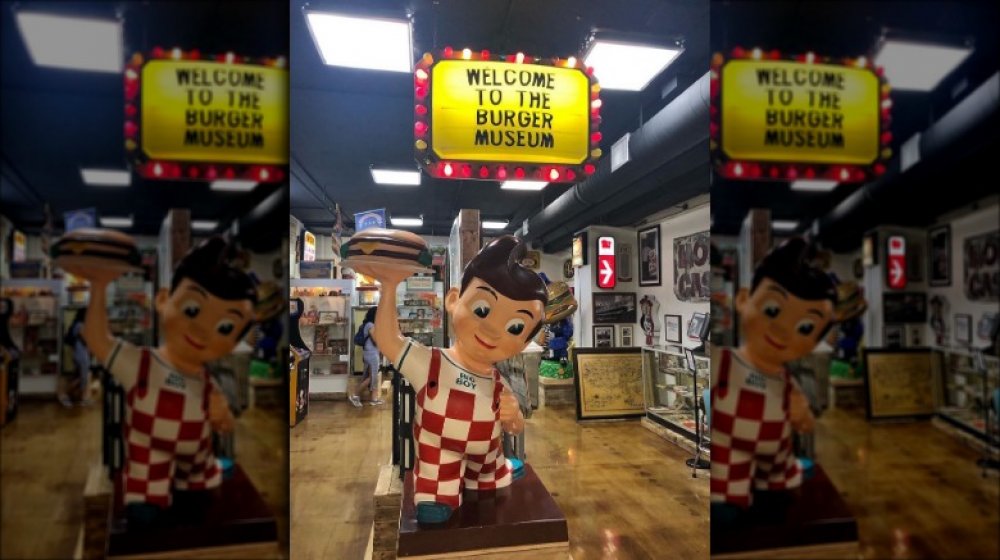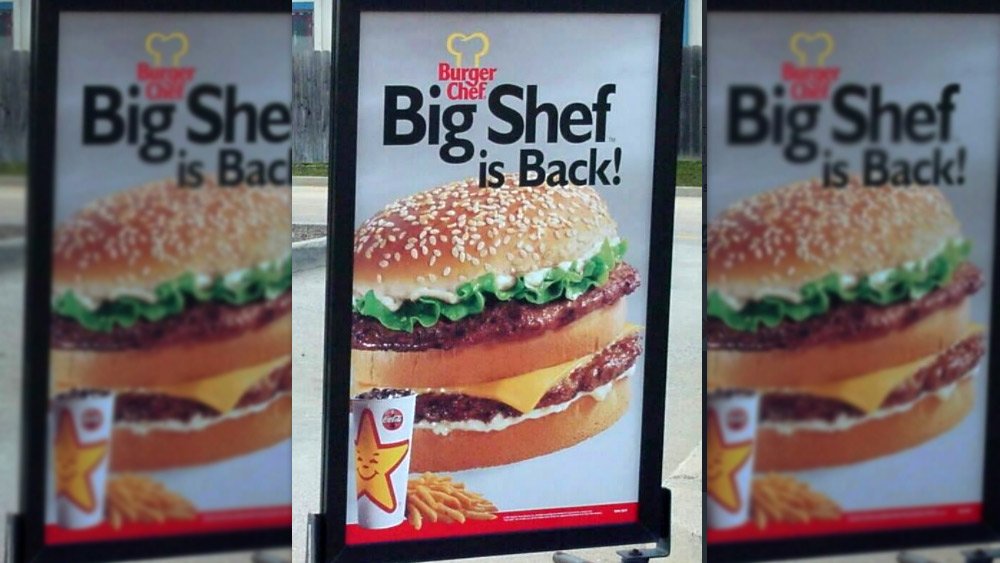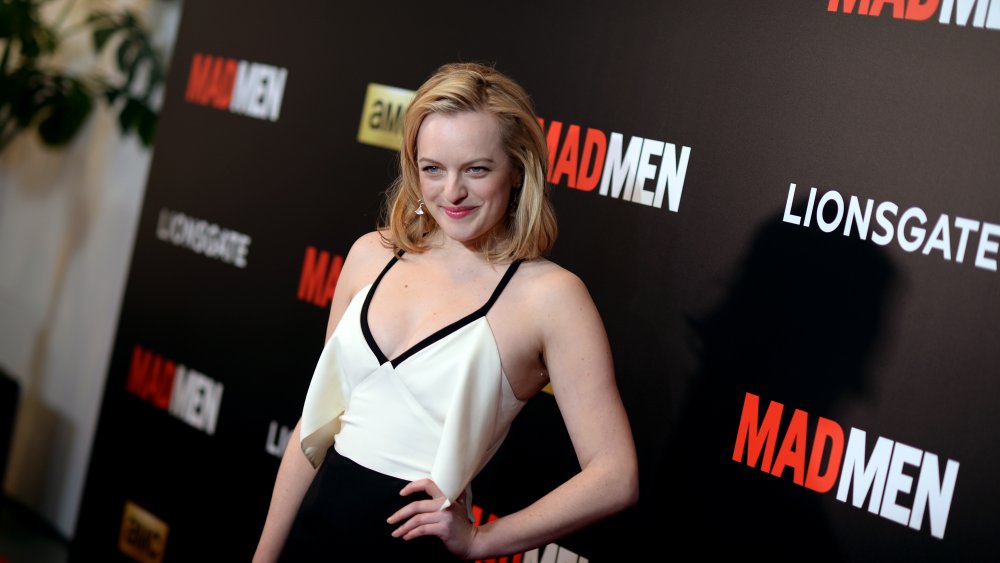The Untold Truth Of Burger Chef
Burger Chef had a name that said it all. Its handle wasn't ambiguous like McDonald's or an acronym like KFC. This franchise was a series of restaurants where chefs made their customers burgers. Now, it may be difficult to imagine, but this humbly named chain was once a cultural juggernaut. According to Hersh Shefrin, Burger Chef had around 1,200 fast food outlets back in 1972. To put that number into perspective, McDonald's had 1,600 restaurants. This meant that Burger Chef, for a moment there, had the second most number of outlets. Some folks also seem as if they still like this place. It even has an unofficial Facebook page that has over 16,000 likes.
But what did Burger Chef do to become such a big deal? And why did this fast food chain disappear? Well, cast these wonders aside, because these questions are about to be answered. This piece will furthermore discuss this chain's legacy, a TV advertisement that they wanted to film, and the unsolved Burger Chef murders.
Burger Chef invented the "happy meal"
Some fries, a drink, a toy, and a burger are synonymous with the McDonald's Happy Meal. A person could easily assume that the Golden Arches came up with this iconic idea. Nevertheless, this hypothesis would be completely incorrect. Burger Chef was the first fast food franchise ever to promote such a feed. An article on MeTV laid out the date that Burger Chef created its Fun Meal. It was in 1973, that Burger Chef changed fast food for kiddos forever when they bundled burgers and a dessert with toys, puzzles, and colorful characters.
You can additionally see a newspaper scan where Burger Chef plugged one of these meals. In July 1973, Lawrence Journal-World published an ad that said, "Now With Every Order of a Big Shef, Fries, and Any Drink A FREE BURGER CHEF AND JEFF YO-YO." Next to this is text was a quaint illustration of the complimentary toy. What kid could resist?
Around six years later, McDonald's released their Happy Meal, and Burger Chef didn't seem to like this development. As Reader's Digest expounded, McDonald's launched its Happy Meal in 1979, and Burger Chef brought a lawsuit for appropriating the Fun Meal idea. Unfortunately, for Burger Chef, the lawsuit was unsuccessful.
Burger Chef tried to hire Ronald MacDonald for an ad
Burger Chef and McDonald's weren't exactly the best of pals. There was even a point in time where the now inoperative chain attempted to use Mickey D's own iconography against them. In 1987, The Telegraph reported on a story where three different generations of the same family had someone called Ronald MacDonald in it. There was a 14-year-old Ronald MacDonald, a 39-year-old Ronald MacDonald, and a 71-year-old Ronald MacDonald. The oldest MacDonald insisted that he didn't deliberately name his son after the Mickey D's mascot, but honestly, that makes this story all the more strange.
The 39-year-old MacDonald told The Telegraph that he was once approached by an advertising company to perform in a Burger Chef commercial. This hypothetical ad would've gone hard after the McNugget makers. MacDonald was to chow down on a hamburger while he told someone his first and last name, thus implying Burger Chef is superior to the Golden Arches. You know, because if 'Ronald MacDonald' ate somewhere other than McDonald's, then the law of wordplay dictates that this establishment would have to be better. Perhaps wisely, the 39-year-old turned down this idea because he didn't want that sort of attention.
The creator of Burger Chef patented some innovative designs
Interestingly enough, Burger Chef wasn't originally designed to be a fast food chain. Scott R. Sanders, the author of a book entitled Burger Chef, said that the first store was made by the president of General Equipment Company, Frank P. Thomas Jr. This man made the restaurant to show off the new food-service machines that his business was manufacturing. Indy Star noted that this restaurant was created in 1957 after he and his brother Donald Thomas had patented a flame broiler.
According to Sanders, this first place was so successful that Thomas Jr. opened up a second demonstration restaurant. After this launch, he went on to own and operate two more Burger Chef restaurants in Indiana. After these stores opened, it became apparent that these eateries could become a chain. General Equipment Company eventually decided that they'd attempt to franchise this idea and wanted a new design for their restaurants. The company approached an architect named Harry E. Cooler to discuss ideas, with the goal of creating a building concept that would help the burger restaurant stand out.
Which, props to the man, he succeeded in doing. Cooler's design was patented by Thomas Jr. in 1960 and had a bold angular sign crowned on top of its building. It also included a dynamic symmetrical archway that patrons would walk under. It just goes to show you how Burger Chef's creator patented some interesting designs throughout the chain's pretty short history.
The Burger Chef chain even opened up in Canada
Burger Chef didn't solely sell its meals to Americans, it briefly slung them in foreign markets, too. And a country that Burger Chef tried to settle in was Canada. Torontoist outlined that they tried to break into this market twice. The first time was in the early 1960s, and then on a second occasion in 1969.
Torontoist furthermore republished some of Burger Chef's original advertisements that were meant to entice the 1969 Canadian public. Two of their ads seemed bold and aggressively confident. One of them proclaimed: "Come to a monster opening at Burger chef." Another declared, "Burger chef heard Toronto likes good food. We got here fast as we could."
However, while Burger Chef was able to talk a good game, they weren't able to hack it. Torontoist said that they did an ad blitz in 1970 but then decided not to market their brand as aggressively. The chain also lost a substantial amount of money, and McDonald's ended up crippling their sales across Canada. Before the '70s had ended, you couldn't find a Burger Chef north of the U.S. border.
Burger Chef was the first place to have a fries and drink combo
Salty potato slices and sugary soda are two of the pillars that help hold up the burger experience. These items are so integral that it's difficult to imagine a world where fast food restaurants don't lump them with the bun and make it a deal. Even so, this world did exist, that is until Burger Chef changed everything. Time remarked that they were the first place to advertise the burger, fries, and a drink combo. They christened this 45 cent deal the "Triple Threat."
Ever since Burger Chef created this deal, a plethora of fast food chains have implemented this concept. McDonald's does a cheeseburger combo meal, and Wendy's once offered free fries plus a drink to patrons that ordered a premium burger through their app. A Singapore restaurant called Route 65 additionally created an amazing bargain where its customers could get its crispy chicken burger, french-fried potatoes, and bubble tea for $9.90.
It's apparent that Burger Chef was way ahead of the curve when it came to this idea. Our hungry stomachs should thank them for this service.
Patrons could customize their burgers at Burger Chef's The Works Bar
Not every Burger Chef idea was adopted by the masses. Their most notable design — that never caught on — was a concept that they called the Works Bar. But what exactly is a Works Bar? Basically, it was like a salad bar but for pickles, onions, and sauces. MLive defined it as a place that patrons could go to put additional condiments on their burgers.
In 1980, The Cincinnati Enquirer printed a Works Bar advertisement. This ad featured a mouth-watering burger illustration and lines that pointed to different parts of this dish. At the start of each line, some bars of text described the additional items that could be added to a burger at the station. On phrase stated, "PILE ON THE PICKLES!" Another said, "ADD A SLICE OR TWO OF FRESH TOMATO." Below the picture and these quips, the franchise had written out their pitch for this concept. "Heap on the value at the Burger Chef Works Bar. Never an extra charge."
It does make sense that this idea didn't become vogue. Not many people want another human's buffet pores sweating onto their condiments. That being said, just imagine living in a universe where getting unlimited pickles for free was the norm. Who wouldn't want to live in that reality?
Four Burger Chef employees were mysteriously murdered in Indiana
Some moments in Burger Chef's history are tragic and genuinely upsetting. In 1978, four employees from Burger Chef's Speedway, Indiana restaurant were mysteriously killed: Jayne Friedt, 20; Ruth Shelton, 17; Danny Davis, 16; and Mark Flemmonds, 16 (via Insider).
A podcast called Unsolved Murders: True Crime Stories unpacked this case. The program outlines that this Burger Chef would have started packing up at 11:00 p.m. But when another Burger Chef worker came just after midnight, they discovered that their fellow employees were missing. They also found a few cash register draws and Shelton's jacket on the ground. When the police came to investigate this crime scene, they didn't respond appropriately. Indianapolis Monthly stated that the police allowed the restaurant to be cleaned up and had one theory that blamed the teenagers for the stolen money. "They didn't process it as a murder; they didn't know it was a murder," said detective Virgil Vandagriff. "Police didn't have a clue what was going on at the restaurant. They kind of messed up the crime scene."
Indianapolis Monthly also detailed that the bodies of Shelton and Davis were eventually found around 20 miles from the restaurant in the Johnson County woods. Friedt and Flemmonds were additionally discovered, and it was clear that all four of them were murdered. WBIW said that this case hasn't been solved and if you have any new information, then you're asked to contact Crime Stoppers.
Hardee's ended up dismantling the Burger Chef franchise
The year was 1981, and General Foods, the company that currently owned Burger Chef, decided it was the right time to sell this chain of restaurants. In a New York Times article from that year, the publication stated that Hardee's planned on buying the whole shebang for about $44 million. The New York Times piece furthermore provided General Food's given reason for selling the Burger Chef brand. James L. Ferguson, the chairman of General Foods, said, "We have concluded that this business was not central to the long-term direction that we see for General Foods."
Nevertheless, Ferguson's above-quoted explanation may not be the entire story. QRS communicated that the company sold this brand after it lost millions of dollars. In another New York Times article from 1972, the General Foods chairman C. W. "Tex" Cook said, "We over‐extended ourselves, primarily by assuming extensive real estate commitments and expanding too rapidly." The same year that Hardee's announced their intentions to purchase Burger Chef, Herald & Review outlined that they planned to rebrand a number of the restaurants. This company wanted to convert some of the joints into their very own Hardee's eateries. Which, after the acquisition went through, is exactly what they did. Moreover, it appears as if no new Burger Chefs have been built since this sale occurred.
A restaurant tried to keep the Burger Chef name
After the Hardee's deal, there was at least one Burger Chef employee that resisted losing this branding. John McDonald's book Flameout reported that Bill Mitchell, a franchise owner, teamed up with some other stores in a lawsuit against General Foods. They claimed that the company had encouraged them to purchase restaurant upgrades even though it was aware of the pending sale. Mitchell had already spent over $117,000 of his own money to upgrade his Burger Chef, however, he couldn't transform it into a Hardee's as his place was too close to a pre-existing one.
Flameout said that Mitchell eventually won a settlement of $100,000 and was allowed to continue using Burger Chef's branding until his retirement. So that's exactly what he did. Mitchell ran this eatery for another 14 years. But all jobs and fast food stores must come to an end and Mitchell retired in 1996. He ended up selling this establishment to his stepdaughter, who then turned it into a Pleasers.
It's truly remarkable that Mitchell was able to keep his Burger Chef up and running for so long after Hardee's had bought up the chain. This man legitimately deserved a medal for his tenacity.
Burger Chef memorabilia is now a collector's item
It's crystal clear that the Burger Chef franchise no longer exists. If a foodie was to search across America's landscapes and cityscapes, they wouldn't find a single official store still operating. But these truths haven't deterred some humans from holding onto the chain's old posters, fun meal toys, and promotional cups.
Furthermore, there was at least a single piece of Burger Chef memorabilia in Florida's Burger Museum. In a 2016 Miami Herald video, there's a moment when you're able to see a Star Wars poster hanging from a wall. If this sheet isn't a lookalike, then it was definitely made for Burger Chef.
The Burger Museum's owner, Sef Gonzalez, isn't the only person that seeks out Burger Chef items either. In 2020, an eBay user put up a post that advertised 136 baseball-shaped disks that originally came from the chain's Fun Meals. While this page didn't include pictures of every item, a majority of these objects feature a photo of a different baseball player and a bunch of facts about them. As of August 2020, the items are still for sale and can be yours for $999.95.
The Big Shef burger came back for a limited time
In a 1979 ad in The Cincinnati Enquirer, Burger Chef outlined what was in their Big Shef dish. They claimed it had, "Two big, all-beef patties on a triple-decker bun. Plus a generous slice of cheese, crispy lettuce, and tasty sauce." This item presumably has its fans, as Hardee's saw fit to serve the Big Shef on a number of occasions.
Swystun Communications said that they gave this hamburger a limited release back in 2001, 2007, and 2014. In a photo that was published alongside the above-mentioned fact, you can see an advertisement for Hardee's "Limited Time Only" Big Shefs. This ad attempted to remind its audience of the defunct Burger Chef by including their name and logo. So, if you're a Burger Chef fan that misses the Big Shef, or a culinary explorer that's just curious to try this dish, there's a slim chance that your taste buds may get to review one. Who knows, Hardee's may cook this item again.
Mad Men used Burger Chef to discuss shared experiences
Hardee's isn't the only group that temporarily brought the Burger Chef brand back. In the episode "Waterloo," the character Peggy Olson pitches an ad campaign to Burger Chef. At first, she's overwhelmed. This is because it's a huge presentation and the moon landing happened the previous night. But Olson's feelings don't negatively impact her pitch, and it goes brilliantly. She starts by saying that the moon landing felt special partly because everyone was doing the same thing at the same time. "Sitting in this room, we can still feel the pleasure of that connection. Because, I realize now, we were starved for it." Olson then goes onto state that Burger Chef can sell its customers the same feeling. "It's bright and clean... And we can have the connection that we're hungry for."
It's fascinating that Peggy says that Burger Chef could provide the same interconnectedness that the moon landing imparted. Because, as we all know, this chain no longer exists. It's as if the writers of Mad Men were implying that this feeling can't last, or it can't be found in a corporate food franchise.
